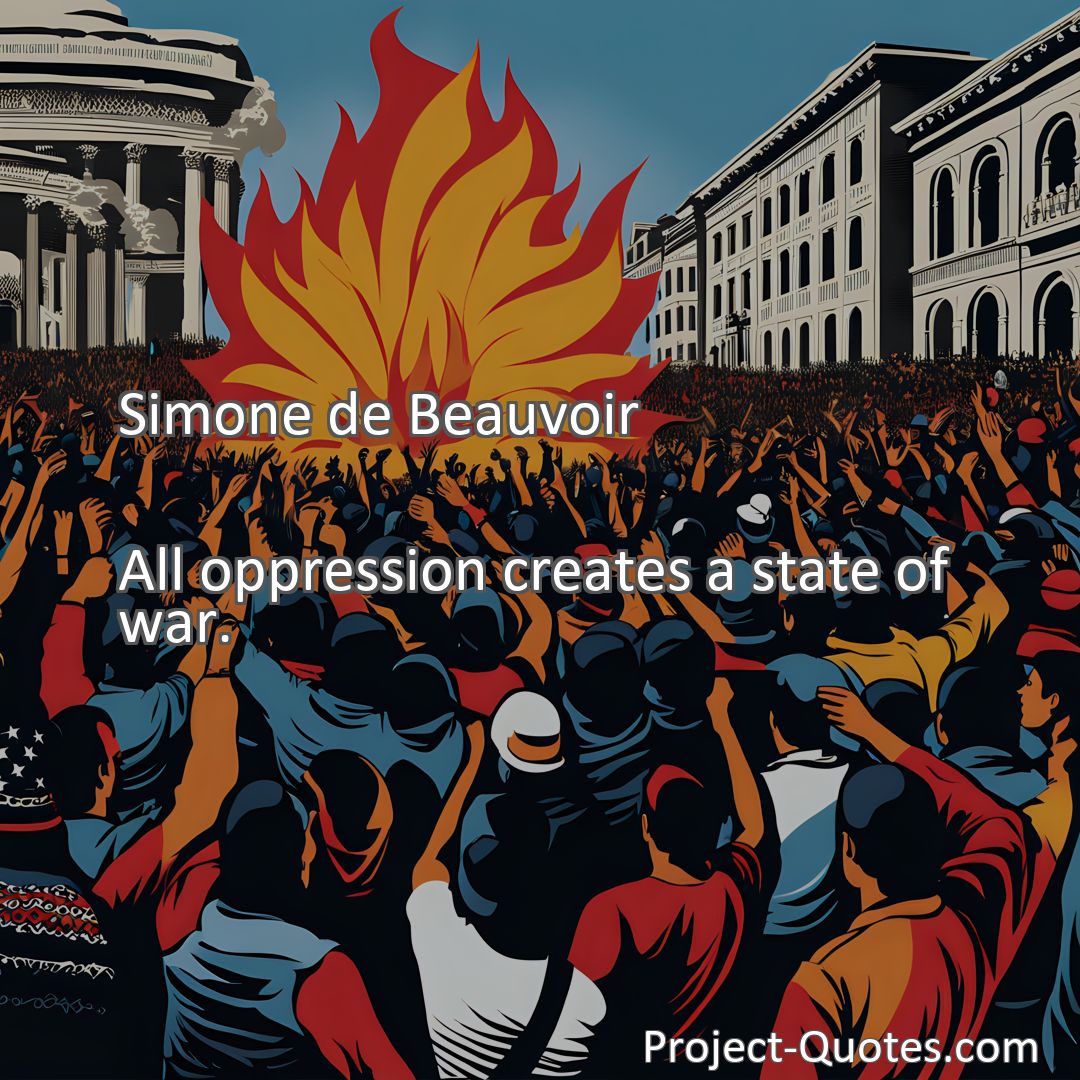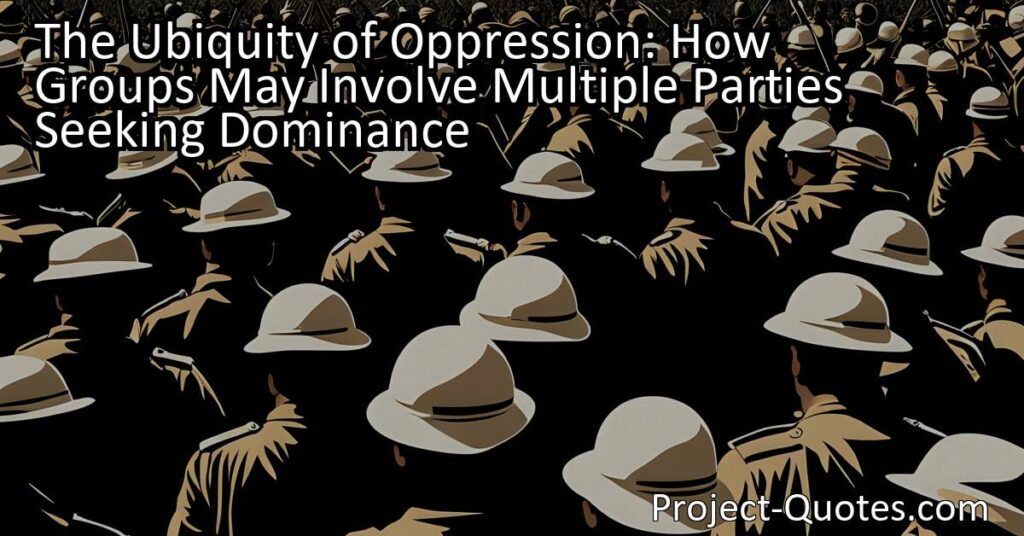All oppression creates a state of war.
Simone de Beauvoir
The Ubiquity of Oppression: How Groups May Involve Multiple Parties Seeking DominanceSimone de Beauvoir’s quote, “All oppression creates a state of war,” sheds light on the destructive nature of oppression and the constant battle for liberation. Oppression goes beyond physical conflicts and involves an asymmetry of power, where the oppressor suppresses and controls the oppressed. By recognizing the pervasiveness of oppression and working collectively to challenge oppressive systems, societies can strive for a future free from the chains of dominance.
Table of Contents
Meaning of Quote – All oppression creates a state of war.
In the words of the renowned feminist philosopher Simone de Beauvoir, “All oppression creates a state of war.” This profound statement carries an incredibly poignant message about the pervasive nature of oppression and the ensuing conflicts it breeds. While oppression may appear in various forms, whether it is based on gender, race, class, or any other factor, its consequences are always destructive, fueling a constant battle for liberation and equality.
To fully grasp the meaning of this quote, it is essential to understand what oppression entails. Oppression is the act of subjecting a person or group to cruel, unjust treatment, depriving them of their fundamental rights and freedoms. It is a mechanism wielded by those in positions of power to maintain dominance over others. Through various systems and structures, oppression restricts and controls the oppressed, depriving them of agency, voice, and dignity.
When an individual or a group is subjected to oppression, it stirs a multitude of emotions, ranging from frustration and outrage to despair and resentment. The oppressed are forced into a position of constant battle, fighting against both the physical and psychological chains that bind them. This ongoing state of war does not necessarily manifest as physical violence but rather as a continuous struggle for recognition, justice, and liberation.
One aspect that distinguishes oppression from other forms of conflict is its inherently one-sided nature. While wars between nations or groups may involve multiple parties seeking dominance, oppression is marked by an imbalance of power. The oppressor holds the upper hand, wielding their authority to systematically suppress and control the oppressed. This asymmetry further intensifies the sense of war, as the oppressed are continually fighting against an overwhelming force.
Moreover, oppression operates on both individual and collective levels, leaving no aspect of life untouched. Individuals facing oppression may experience discrimination, marginalization, and the denial of basic human rights. For instance, women have historically been subjected to gender-based oppression, facing limited opportunities, unequal pay, and discrimination in various spheres of life. Similarly, racial oppression has entrenched discriminatory practices and bias against racial and ethnic minorities, resulting in systemic inequalities and social injustice.
At a collective level, entire communities or groups can be oppressed, facing systemic barriers and disadvantages that hinder their progress and development. These forms of collective oppression can persist over generations, perpetuating cycles of poverty, disadvantage, and unequal access to resources. Oppression thus intensifies the state of war, as the oppressed fight not only for individual liberation but also for the emancipation of their entire community.
It is crucial to acknowledge that the state of war perpetuated by oppression is not limited to physical conflicts but also manifests in psychological and emotional battles. Oppression inflicts deep wounds on the human spirit, leaving scars that can be carried across generations. The daily struggles, the constant invalidation of one’s worth, and the internalized oppression lead to a persistent fight for self-acceptance and identity reclamation.
Simone de Beauvoir’s quote highlights the inextricable link between oppression and conflict, emphasizing that whenever oppression exists, a state of war follows. She reminds us that the fight against oppression requires a collective effort to dismantle the systems that perpetuate it. By recognizing the ubiquity of oppression and the harm it creates, societies can begin to address the roots of conflict and work toward a more just and equitable future.
To overcome the state of war created by oppression, it is essential to raise awareness, challenge societal norms, and dismantle oppressive systems. Education plays a crucial role in fostering empathy, understanding, and critical thinking, empowering individuals to question the status quo and challenge oppressive structures. By nurturing an inclusive and compassionate mindset, society can foster a sense of unity, breaking the cycle of conflict caused by oppression.
Furthermore, advocacy and activism are instrumental in fighting against oppression and creating meaningful change. Individuals and groups must come together to raise their voices, demand social justice, and challenge the oppressive forces that perpetuate a state of war. Solidarity and allyship are crucial in this process, as marginalized communities and their allies unite to amplify their voices and work towards a fairer society.
In conclusion, Simone de Beauvoir’s statement that “All oppression creates a state of war” encapsulates the profound impact of oppression on individuals and communities. Acknowledging the pervasiveness of oppression and its consequences is the first step towards initiating change. By dismantling oppressive systems, fostering inclusivity, and advocating for social justice, societies can work towards extinguishing the fires of war fueled by oppression. Let us strive for a future where equality and liberation replace the state of war, offering a world free from the chains of oppression.
I hope this quote inspired image brings you hope and peace. Share it with someone who needs it today!


